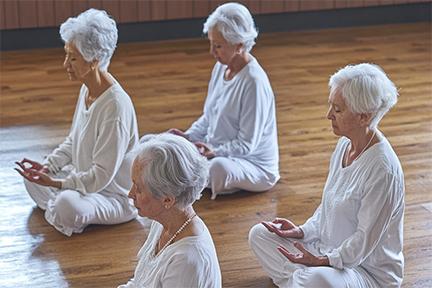
Retirement communities provide seniors a unique blend of independence and support, but maintaining mental well-being in these settings can be challenging.
With the transition from a fully active daily life to a more relaxed pace, focusing on nurturing mental health during these golden years is important to maintain that balance we all need to be happy and fulfilled.
Today, we’re going to chat about some of the practical steps seniors can take to boost their mental well-being while living in retirement communities.
Take a deep breath and read on.
Why Mental Health Matters for Seniors
We’re finally realizing, as a society, that mental health is essential at every stage of life. But it holds particular significance for seniors.
Good mental health leads to better physical health, increased longevity, and a higher quality of life. Emotionally healthy seniors are more resilient to stressors and life changes, common in the transition to retirement and community living.
Enhancing mental well-being helps seniors enjoy their retirement and establishes independence and engagement with their communities.
Furthermore, mental health issues such as depression and anxiety are prevalent among the aging population. These conditions can exacerbate physical illnesses and lead to isolation if left unaddressed. You can combat these issues by prioritizing your mental health and living more fulfilling lives.
Baby Boomers and The Silent Generation often suffered in silence. Thanks to modern tech, there are apps, like Different MHP and mindfulness/meditation apps, that make a world of difference.
Here are some other things you can try.
1. Connect Through Social Engagement
Social engagement is a powerful tool for enhancing mental well-being. Participating in group activities, clubs, or volunteer opportunities within the retirement community can create a sense of belonging and purpose.
Building strong relationships with peers can alleviate loneliness and provide emotional support.
Organized events such as book clubs, game nights, or group outings offer excellent opportunities to connect with others. These activities foster friendships and open doors to new experiences and learning opportunities.
Additionally, volunteering within the community or nearby areas can provide seniors with a sense of purpose and satisfaction, knowing they are contributing positively to society.
2. Engage in Regular Physical Activity
Physical activity is beneficial for physical health and plays a crucial role in mental well-being. Regular exercise releases endorphins, which are natural mood lifters that reduce symptoms of depression and anxiety.
Retirement communities can help make your life better by offering various exercise programs, such as yoga classes, walking groups, or water aerobics.
These activities cater to different fitness levels and abilities, ensuring that all residents can participate and enjoy the benefits of exercise. Additionally, gardening, dancing, or even simple stretching exercises can help seniors stay active and engaged.
3. Lifelong Learning and Mental Stimulation
Lifelong learning and mental stimulation maintain cognitive health and mental well-being as we age. Engagement in activities that challenge the mind can prevent cognitive decline and boost self-esteem.
Retirement communities often provide educational programs, workshops, or classes on various topics. These courses range from learning a new language to exploring art or technology. Participating in these activities keeps the brain active and provides a sense of achievement and purpose.
In addition to formal learning opportunities, try mental exercises such as puzzles, reading, or playing musical instruments. These activities stimulate the mind and offer relaxation and enjoyment.
4. Create a Sense of Purpose and Meaning
A sense of purpose and meaning is vital for mental well-being, especially in retirement. Seniors who feel their lives have purpose are more resilient to stress. Encouraging folks to identify and pursue activities that bring them joy and fulfillment can greatly enhance their mental well-being.
Volunteering is one way seniors can find purpose in their lives. Many facilities offer volunteer programs within the facility or in the surrounding area. Volunteering provides a sense of contribution and purpose and allows seniors to build connections with others and their community.
5. Maintain Emotional Connections with Loved Ones
Strong emotional connections with loved ones are crucial to mental well-being. These connections provide emotional support, reduce feelings of loneliness, and contribute to a sense of belonging.
Regular communication with family and friends maintains emotional connections. Phone calls, video chats, or in-person visits can help seniors feel connected and supported. Family members can play a vital role by initiating communication and visiting regularly when possible.
6. Technology and Innovation
Technology offers numerous benefits for seniors in retirement communities, from facilitating communication with loved ones to providing access to learning resources.
Video calling platforms like Skype or Zoom enable seniors to connect with family and friends. These platforms provide a way for seniors to see and interact with loved ones, reducing feelings of isolation and loneliness.
Take A Holistic Approach to Your Mental Well-Being
Maintaining mental well-being in retirement communities requires a comprehensive and multifaceted approach. Actively engaging in social interaction, regular physical activity, continuous learning, and nurturing emotional connections all enhance quality of life.
Moreover, finding purpose through engagement in meaningful activities like volunteering provides psychological benefits and a sense of fulfillment.
Integrating these elements provides seniors with more vibrant, connected, and fulfilling lives, ensuring that their retirement years are as enriching as possible.
Image created with Midjourney
